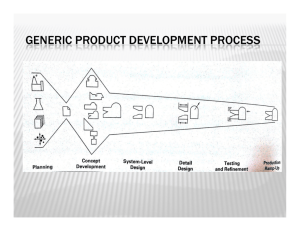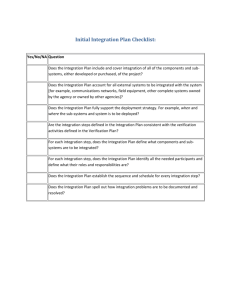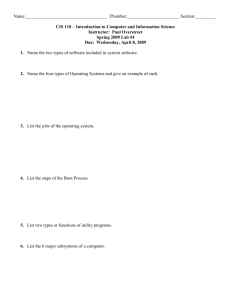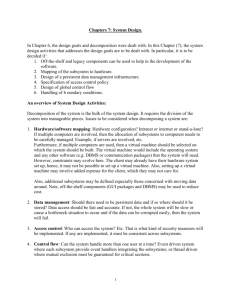Lecture 2
advertisement
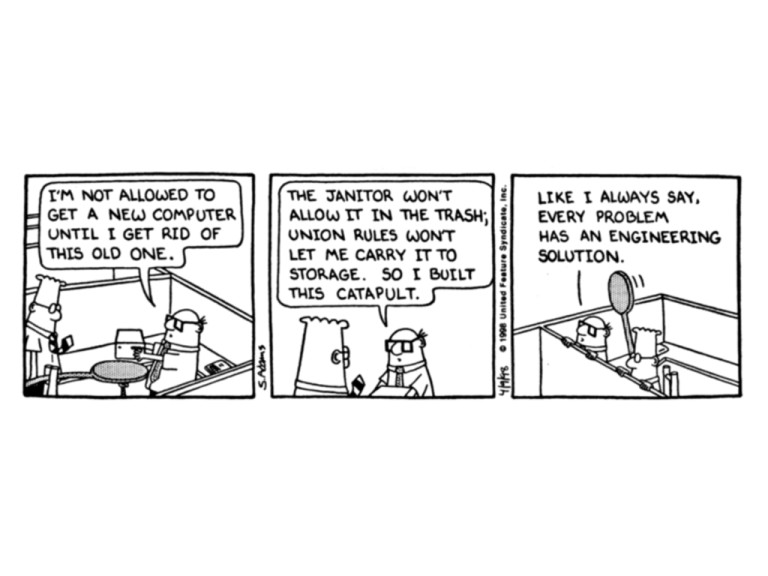
1 Quiz Preparation Have Quiz sheet ready. Top Center: QUIZ 2 Upper Right: » Name (L, F, MI), » Today’s date 8/28/12 » Lab day , time » section number Lab Day/Time Mon. Mon. Tue. Wed. Wed. Wed. Thu. Thu. Fri. Fri. 1:00 3:00 2:00 1:00 1:00 3:00 3:00 2:00 2:00 1:00 1:00 Section Number 8 9 36 10 10 11 11 29 35 12 12 2 Announcements Each team must purchase the following before Lab 5: » 2 Lego Power Functions 8883 M-Motors » Approx. $10 each Waiting to hear about availability from the Scientific Supply Store on campus. 3 Quiz 1. What does your team need for Lab 5 (select only one answer) ? » a. Two LEGO motors » b. Keypad code » c. bucket of LEGOs » 2. Motors are provided for you at no cost (True or False). 4 Design Project 5 Competition Each team designs and builds a car » Specifications in syllabus » Work on car done outside of class » Team must build the car with their own supplies – No supplies are provided Lectures/Labs 1-7 provide background material for the design project Start early on the design project! COMPETITION –Thursday, 11/8, at 7 PM in BR 125. 6 Optional Gates (+5 sec. penalty if missed) Push block across finish line or incur a +30 sec. penalty START/ FINISH BLOCK Required Gates Engineering Design Process Identify Customer Needs Establish Product Specification Define Alternative Concepts Select the Most Suitable Concept Design/Integrate Subsystems Build/Test Prototype Design/Build Production Produce Track 8 Quiz 3. In this class, our design process stops after » a. Prototyping (making one) » b. Production (making many) 9 Engineering Design Process Identify Customer Needs Establish Product Specification Define Alternative Concepts Select the Most Suitable Concept Design/Integrate Subsystems Build/Test Prototype Design/Build Production Produce Track 10 Engineering Design Process Example: Zero-Emission Vehicle Identify customer needs. » “I want a vehicle that is affordable.” » “I want a vehicle I can use to drive to and from work every day.” » “I want a vehicle that does not pollute the environment.” » “I want a vehicle that is safe to operate. 11 Engineering Design Process Identify Customer Needs Establish Product Specification Define Alternative Concepts Select the Most Suitable Concept Design/Integrate Subsystems Build/Test Prototype Design/Build Production Produce Track 12 Engr. Design Process (cont’d) Establish product specification. » Performance should be comparable to a conventional automobile. » Initial purchase cost should be $30,000. » Consumables must be recyclable or not release toxins to the environment upon disposal or an accident 13 Quiz 4. Which one establishes a contract between the customer and the supplier? » a. Customer needs » b. Specifications 14 Engineering Design Process Identify Customer Needs Establish Product Specification Define Alternative Concepts Select the Most Suitable Concept Design/Integrate Subsystems Build/Test Prototype Design/Build Production Produce Track 15 Brainstorming The brain uses two basic modes in the design process: » creative mode » critical mode These two modes work against each other. Some people are better at one mode than the other Brainstorming separates the two processes into different time frames. It is important not to think critically during brainstorming. 16 Engr. Design Process (cont’d) Define alternative strategies » » » » Lithium-ion battery Lead-acid battery Compressed Air Etc. 17 Engineering Design Process Identify Customer Needs Establish Product Specification Define Alternative Concepts Select the Most Suitable Concept Design/Integrate Subsystems Build/Test Prototype Design/Build Production Produce Track 18 Engr. Design Process (cont’d) Select the most suitable concept. » Cost » Environmental risks » Reliability » Ease of use – Design cost – Material cost – Assembly cost » » » » Weight Appearance Performance Safety 19 Tradeoffs in Engineering Design Examples: Cost vs. performance Safety vs. performance Performance vs. reliability 20 Selecting the Most Suitable Concept Typically, you have » Several design alternatives » Multiple, often conflicting, criteria How do you sort all this out? 21 Pugh Chart BEST 22 Design Reports A Pugh chart will be REQUIRED for each design decision in your preliminary and final design reports. 23 Pugh Chart Advantages Gives structure to the decision-making process Documents the decision-making process 24 Alternative Methods Positives and Negatives (Pros vs Cons) Analytical Hierarchy Process House of Quality Method 25 House of Quality 26 Quiz 5. Brainstorming is the process of critiquing various alternatives to select the best one. Write TRUE or FALSE 27 Engineering Design Process Identify Customer Needs Establish Product Specification Define Alternative Concepts Select the Most Suitable Concept Design/Integrate Subsystems Build/Test Prototype Design/Build Production Produce Track 28 Engr. Design Process (cont’d) Design the subsystems and integrate them » Break a complex system into small subsystems Zero-Emission Car Body Motor/ Trans. Power Mgmt Electrical 29 Engineering Design Process Identify Customer Needs Establish Product Specification Define Alternative Concepts Select the Most Suitable Concept Design/Integrate Subsystems Build/Test Prototype Design/Build Production Produce Track 30 Engr. Design Process (cont’d) Build and test a prototype » Build and test each subsystem » Integrate and test the subsystems Zero-Emission Car Body Motor/ Trans. Power Mgmt Electrical 31 Engineering Design Process Identify Customer Needs Establish Product Specification Define Alternative Concepts Select the Most Suitable Concept Design/Integrate Subsystems Build/Test Prototype Design/Build Production Produce Track 32 Design for Lego Car Specification is given. Define alternative concepts. Select the most suitable concept. » Bottom line is finishing time. » “Cost” is figured in by penalizing use of parts. » Car should be sturdy enough not to fly apart during race. » Car and course must pass minimal safety specs. 33 Design Subsystems Car path & steering strategy Power supplied to vehicle Torque vs speed Vehicle mass, wheels, etc. 34 Lego Car Subsystems Output voltage » Higher output voltage increases speed » Penalties apply above 10V Power supply (batteries) » One 9V battery (light, but less than 10V) » Two 9V batteries (≥10V, but heavy) » Watch batteries (very light, but drain quickly) Wheel size and gears » Torque vs. speed tradeoff Drive strategy » Front wheel vs. rear wheel drive Course path » Passing through all gates vs. missing gates » Pushing block vs. not pushing block Body » Light vs. heavy 35 Further Design Steps Build and test, then modify!!! Production design, distribution, and tracking are not relevant to a single-shot prototype design. 36
